WATERVILLE — The tourism industry in Kennebec Valley is in need of transformational change before the region can live up to its potential as a travel destination.
That’s according to an assessment from Destination International, a marketing organization that conducted a survey on behalf of the Maine Office of Tourism over the past year to determine the state’s tourism-readiness. The assessment’s results broke down into two major factors: a location’s strength as a destination and the strength of the community’s engagement.
The results revealed that the Kennebec Valley, which the tourism office defines as the stretch of land along the Kennebec River from Moosehead Lake in Jackman down to Gardiner, is perceived as a weak tourist destination with weak community engagement.
The Kennebec Valley is not alone. The entire state is perceived as a weak destination with weak community engagement. Only the Greater Portland and Casco Bay area and the Greater Bangor area fared slightly better than Maine’s average score.
The statewide assessment was conducted using the results of a survey of 1,000 people working in various areas of the tourism industry, including culinary, retail, lodging, service providers, government leaders and others. Kennebec Valley’s assessment was based on the results of 78 respondents ranging in age from 18 to 65 and beyond. The general public was not involved in the survey.
Destination International’s Paul Ouimet, the managing director of DestinationNEXT — the model Ouimet created to conduct the assessment — explained to a group of regional stakeholders at the Waterville Opera House Thursday morning that 20 variables are used to score the assessment based on the variable’s relative importance in the region.
The valley’s perceived performance in the most important variables — convention and meeting facilities, attractions and entertainment, accommodations and mobility and access — was significantly below the industry’s average destination strength. Survey takers found that the region does not have the necessary convention, meeting and trade show facilities to compete with other areas or states. While the diversity of outdoor recreation options is expansive, the region lacks famous attractions that draw people to stay several days. Additionally, survey takers said high-quality dining options, shopping opportunities, well-known brand name hotels and public transportation that makes it easy for visitors to get around are in short supply.
Likewise, the region’s perceived community support and engagement were rated poorly in the most relevant categories among survey takers. The valley scored either slightly or significantly below industry average in performance of industry support, membership strength and support, hospitality culture and regional cooperation. Ouimet said Maine’s tourism office is one of the most poorly funded in the country.
But Ouimet said Maine can try concrete things to improve the strength of the destination and community support and engagement.
To improve engagement, the collaboration and partnership among government, universities and colleges and stakeholders in the private sector needs to improve, he said. They all need to figure out together what experiences and attractions the region needs in order to become a better destination.
Once that occurs, the region can build its brand and tell the story of what the region has to offer through digital platforms, such as social media and peer to peer review sites.
More and more in the digital age, Ouimet said, it’s less about sales and marketing and more about product development and customer service in order to meet and exceed expectations.
Customers are looking for a unique experience when it comes to deciding where to travel. For example, cities have used light shows to re-energize static places and transform them into a brand new experience.
In Montreal, the Notre Dame basilica puts on a stunning light show called AURA that highlights the church’s architectural detail. Ouimet said people line up around city blocks to get into the building. He noted that the Coastal Maine Botanical Gardens in Boothbay does something similar with its Gardens Aglow event.
“When you see a picture of something like this on Instagram, it makes you want to go visit,” Ouimet said.
When Chemainus, Canada —a small town on Vancouver Island — lost its lumber mill, the town decided to commission 39 murals to be painted on buildings along Main Street, reinventing itself as must-see tourist destination, Ouimet said.
Former mill towns in Maine could do something similar by redeveloping abandoned mills as arts and culture complexes, he said.
Chemainus built on their progress ten years later when they purchased a Boeing 737 and sunk it in the ocean to create an artificial reef for scuba divers.
In Edmonton, Alberta, Canada, the city capitalized on its cold temperatures by creating a network of ice skating trails that are bathed with vibrant, colorful lights.
Revelstoke Mountain Resort in British Columbia, Canada, created the Pipe Mountain Coaster to use a ski hill that was dead in the summer time.
In Destin, Florida, companies are renting out see-through kayaks and canoes to make the water sport an entirely new experience.
He said some solutions could be as simple as fleshing out biking and hiking trails in the communities.
But in order to make these transformational changes, Ouimet said, the state and the Kennebec Valley need tourism funding. Some states and cities use an occupancy tax from hotels and other lodging to fund tourism councils that work to make these changes.
Ouimet said success in the tourism industry spills over into the rest of the economy.
“If you fall in love with the city, you’re more likely to move there or take a business there,” he said. “You have to make a bigger argument for tourism that it’s about broader economic development.”
Emily Higginbotham — 861-9239
ehigginbotham@centralmaine.com
Copy the Story LinkSend questions/comments to the editors.






Success. Please wait for the page to reload. If the page does not reload within 5 seconds, please refresh the page.
Enter your email and password to access comments.
Hi, to comment on stories you must . This profile is in addition to your subscription and website login.
Already have a commenting profile? .
Invalid username/password.
Please check your email to confirm and complete your registration.
Only subscribers are eligible to post comments. Please subscribe or login first for digital access. Here’s why.
Use the form below to reset your password. When you've submitted your account email, we will send an email with a reset code.